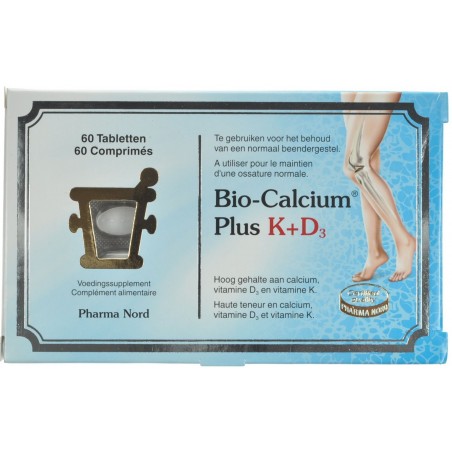- -10%



What is calcium?
Calcium is the most abundant mineral in the human body, which contains approximately 1.2 Kg, 99% of which is stored in bones and teeth, with the remaining 1% present in the blood and other bodily tissues. The skeleton acts as a reservoir for calcium; if the intake of calcium is insufficient, bones become depleted in calcium. Dietary sources of calcium include dairy products, fish and some green vegetables. Oxalic acid, which is found in some green vegetables like spinach, is a potent inhibitor of calcium absorption. The body is best equipped to absorb calcium and build up bone tissues up to the age of 35, after which bone density is lost at a rate of approximately 0.3% per year (1% in post-menopausal women). Calcium cannot be absorbed from the digestive system without vitamin D, which is made in the skin in response to sunlight (vitamin D levels decline with age, and a daily intake of 200-400 IU/day is required). Vitamin K promotes the uptake of calcium into bone tissue. Many adults receive just half the amount of calcium they require from the diet each day. Calcium supplements are available in a variety of chemical forms, most commonly calcium carbonate, calcium citrate, calcium gluconate and calcium phosphate. The elemental calcium provided varies with chemical form, e.g. calcium carbonate provides 40% elemental calcium, whereas calcium gluconate provides only 9% elemental calcium. The lower the elemental calcium content, the more tablets that are required to meet recommended intakes.
What does calcium do?
Calcium is responsible for maintaining healthy bones and teeth. Calcium is important for the maintenance of a healthy heartbeat, the transmission of nervous impulses and the contraction of skeletal muscles. Calcium also promotes healthy blood clotting, healthy blood pressure, and wound healing.
How much calcium should you take?
The Recommended Daily Allowance for calcium has recently been revised by the National Research Council of the USA to 1000 mg/day for men and women aged 19-50 years, and 1200 mg/day for those aged 50-70 years.
Are there adverse effects from taking calcium?
A daily calcium intake as high as 2500 mg/day appears to be safe with no general adverse effects reported. Higher daily calcium intakes may cause gastrointestinal disturbance, interfere with the absorption of zinc, iron and magnesium, and lead to the formation of kidney stones in susceptible individuals. Patients with thyroid or kidney disease should take calcium supplements with caution. Calcium supplements may interfere with the action of the calcium channel blocking drug Verapamil.
About Pharma-Nord Bio-Calcium (plus vitamins D3 and K)
Each tablet of Pharma-Nord Bio-Calcium contains 500 mg of calcium (as calcium carbonate), in an easily absorbable form with a high percentage of elemental calcium. In addition, each tablet contains 5 µg of vitamin D3, which promotes calcium absorption from the small intestine, and 35 µg of vitamin K which stimulates the formation of bone tissue. Pharma Nord recommends 1-2 tablets/day. Pharma-Nord Bio-Calcium is produced under Danish pharmaceutical control.
The advice of your pharmacist:
The product Bio Calcium + K + D3 Comp 60 is made (and / or distributed) with the highest quality standards by the company Pharmanord. On its Web site, with its experience in selling quality products, Pharmonet presents all the products of this brand available on the market.
However, if the product Bio Calcium + K + D3 Comp 60 is not conform to your expectations for any reason whatsoever, do not hesitate to inform us and we will forward your comments directly to the company Pharmanord.